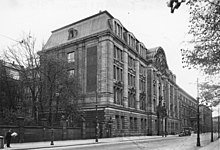
Back Gestapo Afrikaans Geheime Staatspolizei ALS غيستابو Arabic جيستابو ARZ Gestapo AST Gestapo Azerbaijani Gestapo BCL Гестапа Byelorussian Таемная дзяржаўная паліцыя BE-X-OLD Гестапо Bulgarian
| Geheime Staatspolizei | |
 | |
 Gestapo headquarters at Prinz-Albrecht-Straße 8 in Berlin (1933) | |
| Agency overview | |
|---|---|
| Formed | 26 April 1933 |
| Preceding agency |
|
| Dissolved | 8 May 1945 |
| Type | Secret police |
| Jurisdiction | Germany and Occupied Europe |
| Headquarters | Prinz-Albrecht-Straße 8, Berlin 52°30′25″N 13°22′58″E / 52.50694°N 13.38278°E |
| Employees | 32,000 (1944 est.)[1] |
| Ministers responsible |
|
| Agency executives |
|
| Parent agency | |
The Geheime Staatspolizei (German pronunciation: [ɡəˈhaɪmə ˈʃtaːtspoliˌtsaɪ] ⓘ; transl. "Secret State Police"), abbreviated Gestapo (/ɡəˈstɑːpoʊ/ gə-STAH-poh, German: [ɡəˈʃtaːpo] ⓘ),[3] was the official secret police of Nazi Germany and in German-occupied Europe.
The force was created by Hermann Göring in 1933 by combining the various political police agencies of Prussia into one organisation. On 20 April 1934, oversight of the Gestapo passed to the head of the Schutzstaffel (SS), Heinrich Himmler, who was also appointed Chief of German Police by Hitler in 1936. Instead of being exclusively a Prussian state agency, the Gestapo became a national one as a sub-office of the Sicherheitspolizei (SiPo; Security Police). From 27 September 1939, it was administered by the Reich Security Main Office (RSHA). It became known as Amt (Dept) 4 of the RSHA and was considered a sister organisation to the Sicherheitsdienst (SD; Security Service).
The Gestapo committed widespread atrocities during its existence. The power of the Gestapo was used to focus upon political opponents, ideological dissenters (clergy and religious organisations), career criminals, the Sinti and Roma population, handicapped persons, homosexuals, and, above all, the Jews.[4] Those arrested by the Gestapo were often held without judicial process, and political prisoners throughout Germany—and from 1941, throughout the occupied territories under the Night and Fog Decree (German: Nacht und Nebel)—simply disappeared while in Gestapo custody.[5] Contrary to popular perception, the Gestapo was actually a relatively small organization with limited surveillance capability; despite this, the Gestapo proved extremely effective due to the willingness of ordinary Germans to report on fellow citizens. During World War II, the Gestapo played a key role in the Holocaust. After the war ended, the Gestapo was declared a criminal organisation by the International Military Tribunal (IMT) at the Nuremberg trials, and several top Gestapo members were sentenced to death.
- ^ Gellately 1992, p. 44.
- ^ Wallbaum 2009, p. 43.
- ^ Childers 2017, p. 235.
- ^ Johnson 1999, pp. 483–485.
- ^ Snyder 1994, p. 242.
© MMXXIII Rich X Search. We shall prevail. All rights reserved. Rich X Search